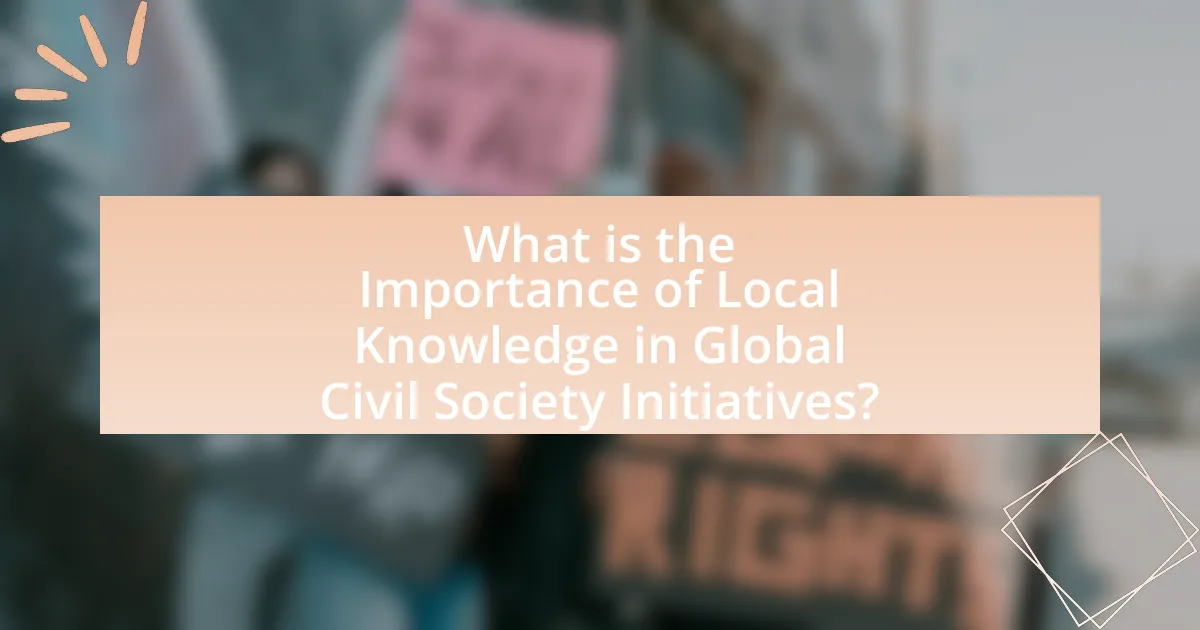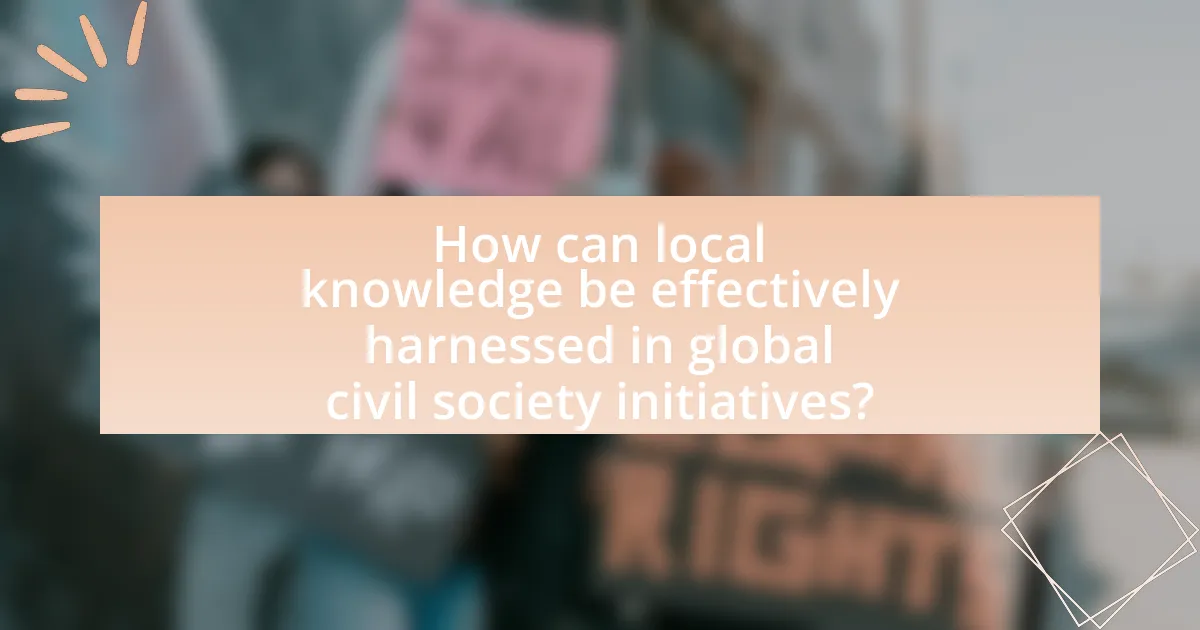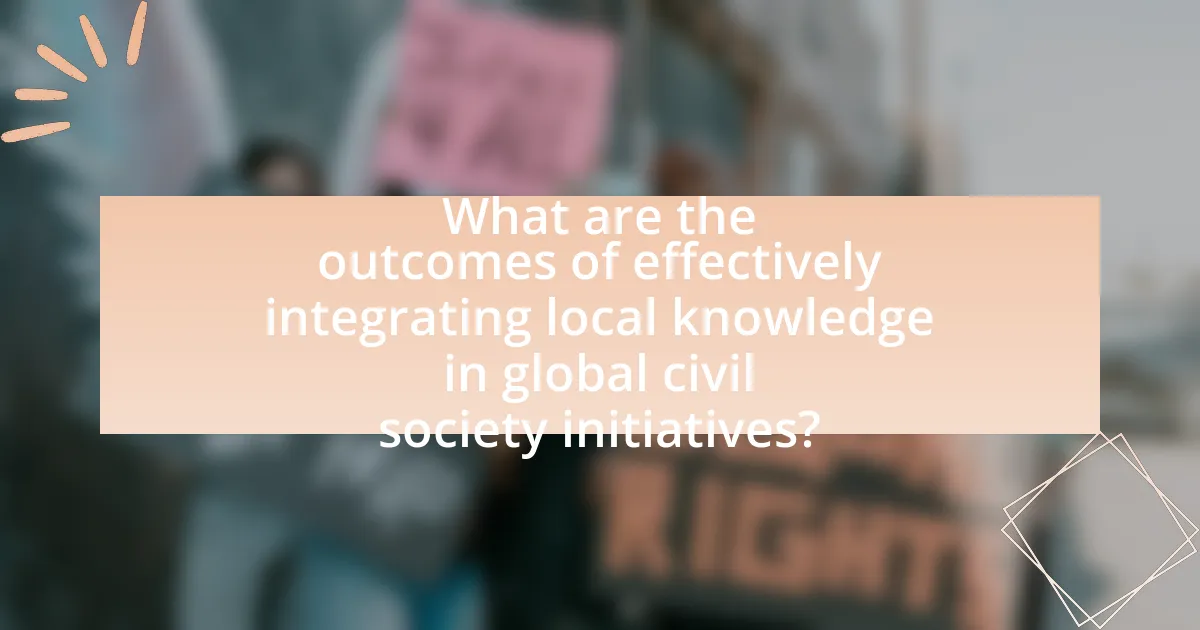Local knowledge plays a critical role in the success of global civil society initiatives by ensuring that programs are culturally relevant and effectively address the specific needs of communities. Research indicates that initiatives incorporating local insights achieve significantly higher success rates, fostering trust and collaboration between global organizations and local populations. The article explores the importance of local knowledge in enhancing community engagement, influencing decision-making, and addressing specific community needs, while also discussing the challenges and strategies for integrating local perspectives into global frameworks. It highlights the positive impact of local knowledge on project outcomes and sustainable development, providing evidence and practical steps for organizations to effectively harness this valuable resource.

What is the Importance of Local Knowledge in Global Civil Society Initiatives?
Local knowledge is crucial in global civil society initiatives because it ensures that programs are culturally relevant and effectively address the specific needs of communities. By integrating local perspectives, initiatives can leverage existing social structures and resources, leading to higher engagement and sustainability. For instance, research by the World Bank highlights that projects incorporating local knowledge have a 30% higher success rate in achieving their objectives compared to those that do not. This demonstrates that local insights not only enhance the effectiveness of initiatives but also foster trust and collaboration between global organizations and local communities.
Why is local knowledge crucial for the success of global civil society initiatives?
Local knowledge is crucial for the success of global civil society initiatives because it ensures that programs are culturally relevant and effectively address the specific needs of communities. Understanding local contexts, customs, and social dynamics allows organizations to tailor their approaches, increasing community engagement and support. For instance, initiatives that incorporate local perspectives have been shown to achieve higher success rates, as evidenced by the World Bank’s findings that projects with local stakeholder involvement are 30% more likely to be successful. This alignment with local realities fosters trust and collaboration, which are essential for sustainable impact.
How does local knowledge enhance community engagement in these initiatives?
Local knowledge enhances community engagement in initiatives by fostering trust and relevance among community members. When initiatives incorporate local knowledge, they align with the specific cultural, social, and economic contexts of the community, making the initiatives more relatable and effective. For example, a study by the International Institute for Environment and Development found that projects that utilized local knowledge had a 30% higher success rate in community participation compared to those that did not. This demonstrates that leveraging local insights not only increases participation but also ensures that the initiatives address the actual needs and priorities of the community, leading to more sustainable outcomes.
What role does local knowledge play in addressing specific community needs?
Local knowledge is crucial in addressing specific community needs as it provides insights into the unique cultural, social, and environmental contexts of a community. This understanding enables tailored solutions that resonate with local values and practices, enhancing the effectiveness of initiatives. For instance, a study by the International Institute for Environment and Development highlights that local knowledge can improve resource management and disaster response by incorporating traditional practices and local expertise. Such integration leads to more sustainable and accepted outcomes, demonstrating the significant role local knowledge plays in community-focused initiatives.
How does local knowledge influence decision-making in global civil society initiatives?
Local knowledge significantly influences decision-making in global civil society initiatives by providing context-specific insights that enhance the relevance and effectiveness of interventions. This localized understanding allows organizations to tailor their strategies to the unique cultural, social, and economic conditions of the communities they aim to serve. For instance, research by the International Institute for Environment and Development highlights that initiatives grounded in local knowledge are more likely to achieve sustainable outcomes, as they align with the needs and priorities of the affected populations. Additionally, incorporating local perspectives fosters community ownership and engagement, which are critical for the success of global initiatives.
What are the implications of ignoring local knowledge in these initiatives?
Ignoring local knowledge in global civil society initiatives leads to ineffective solutions and potential harm to communities. When local insights and practices are overlooked, initiatives may fail to address the actual needs and cultural contexts of the populations they aim to serve. For instance, a study by the International Institute for Environment and Development highlights that development projects lacking local engagement often result in wasted resources and community resistance, as they do not align with local priorities or knowledge systems. This disconnect can exacerbate existing issues, such as social inequality and environmental degradation, ultimately undermining the goals of the initiatives.
How can local knowledge improve the effectiveness of policy implementation?
Local knowledge can significantly improve the effectiveness of policy implementation by ensuring that policies are tailored to the specific needs and contexts of the communities they affect. This localized understanding allows policymakers to identify unique challenges and opportunities, leading to more relevant and practical solutions. For instance, a study by the World Bank found that community-driven development projects that incorporated local knowledge resulted in a 20% increase in project success rates compared to those that did not. By leveraging local insights, policymakers can enhance stakeholder engagement, foster trust, and ultimately achieve better outcomes in their initiatives.
What challenges arise when integrating local knowledge into global civil society initiatives?
Integrating local knowledge into global civil society initiatives presents several challenges, primarily including cultural misunderstandings, power imbalances, and the difficulty of aligning local practices with global frameworks. Cultural misunderstandings can lead to misinterpretations of local needs and priorities, resulting in ineffective or irrelevant initiatives. Power imbalances often arise when global organizations impose their agendas without adequately valuing local perspectives, which can marginalize community voices. Additionally, aligning local practices with global frameworks can be complex, as local knowledge may not fit neatly into standardized models used by global initiatives, leading to conflicts in implementation. These challenges highlight the necessity for genuine collaboration and respect for local contexts in global civil society efforts.
How can cultural differences impact the utilization of local knowledge?
Cultural differences can significantly impact the utilization of local knowledge by influencing how communities perceive, value, and share their traditional practices and insights. For instance, in cultures that prioritize collective knowledge and communal decision-making, local knowledge may be more readily shared and integrated into broader initiatives. Conversely, in cultures that emphasize individualism, local knowledge may be guarded or underutilized, limiting its application in global civil society initiatives. Research by Berkes (2012) in “Sacred Ecology” highlights that cultural context shapes the transmission and acceptance of local ecological knowledge, demonstrating that cultural frameworks can either facilitate or hinder the effective use of such knowledge in addressing global challenges.
What strategies can be employed to overcome barriers to integrating local knowledge?
To overcome barriers to integrating local knowledge, strategies such as fostering collaboration between local communities and external stakeholders, utilizing participatory approaches, and providing training and capacity-building initiatives can be employed. Collaboration ensures that local voices are heard and valued, which enhances trust and facilitates knowledge sharing. Participatory approaches, such as community workshops and focus groups, actively involve local populations in decision-making processes, ensuring that their insights are incorporated. Training and capacity-building initiatives equip local communities with the skills needed to articulate their knowledge effectively, thereby bridging gaps between local and external actors. These strategies have been shown to improve project outcomes and sustainability, as evidenced by case studies in development projects where local knowledge significantly contributed to success.

How can local knowledge be effectively harnessed in global civil society initiatives?
Local knowledge can be effectively harnessed in global civil society initiatives by integrating community insights into decision-making processes. This approach ensures that initiatives are culturally relevant and address the specific needs of local populations. For example, the World Bank’s Community-Driven Development projects demonstrate that when local stakeholders are involved in project design and implementation, the success rate increases significantly, as evidenced by a study showing a 20% improvement in project outcomes. By valuing and utilizing local expertise, global initiatives can enhance their effectiveness and sustainability.
What methods exist for collecting and utilizing local knowledge?
Methods for collecting and utilizing local knowledge include participatory research, community mapping, and ethnographic studies. Participatory research actively involves community members in the data collection process, ensuring that their insights and experiences shape the outcomes. Community mapping engages locals in visualizing their environment, which helps identify resources and challenges specific to their context. Ethnographic studies provide in-depth understanding through observation and interviews, capturing the nuances of local practices and beliefs. These methods have been validated by numerous case studies, such as the World Bank’s Community-Driven Development projects, which demonstrate that incorporating local knowledge leads to more effective and sustainable development outcomes.
How can participatory approaches enhance the collection of local knowledge?
Participatory approaches enhance the collection of local knowledge by actively involving community members in the knowledge-gathering process, which leads to more accurate and contextually relevant information. When individuals from local communities contribute their insights and experiences, the data collected reflects the true socio-cultural dynamics and environmental conditions of the area. Research by Cornwall and Jewkes (1995) in “What is participatory research?” highlights that such engagement fosters trust and encourages open communication, resulting in richer and more diverse knowledge. Additionally, participatory methods, such as focus groups and community workshops, facilitate the sharing of tacit knowledge that may otherwise remain unrecorded, thereby preserving valuable local traditions and practices.
What technologies can facilitate the integration of local knowledge?
Technologies that can facilitate the integration of local knowledge include Geographic Information Systems (GIS), mobile applications, and collaborative platforms. GIS enables the visualization and analysis of spatial data, allowing local knowledge to be mapped and shared effectively. Mobile applications can collect and disseminate local insights in real-time, enhancing community engagement and participation. Collaborative platforms, such as online forums and social media, foster communication and knowledge exchange among local stakeholders, ensuring that diverse perspectives are integrated into decision-making processes. These technologies have been proven to enhance community resilience and inform policy-making by leveraging local expertise and experiences.
How can collaboration between local communities and global organizations be fostered?
Collaboration between local communities and global organizations can be fostered through the establishment of mutual trust and open communication channels. By engaging local stakeholders in decision-making processes, global organizations can ensure that initiatives are culturally relevant and address the specific needs of the community. For example, the United Nations Development Programme (UNDP) emphasizes participatory approaches that incorporate local knowledge, which has been shown to enhance project effectiveness and sustainability. Furthermore, capacity-building initiatives that empower local leaders and organizations can create a more equitable partnership, leading to shared goals and resources.
What are the best practices for building trust between local communities and global initiatives?
The best practices for building trust between local communities and global initiatives include active engagement, transparency, and mutual respect. Active engagement involves involving community members in decision-making processes, ensuring their voices are heard and valued. Transparency requires clear communication about goals, processes, and potential impacts of initiatives, fostering an environment of openness. Mutual respect is essential, recognizing and valuing local knowledge and cultural practices, which enhances collaboration. Research shows that initiatives that prioritize these practices are more likely to succeed, as evidenced by the World Bank’s findings that community involvement leads to better project outcomes and sustainability.
How can shared goals be established to align local and global interests?
Shared goals can be established to align local and global interests by engaging stakeholders in collaborative dialogue that identifies common values and objectives. This process involves local communities, global organizations, and policymakers working together to understand each other’s needs and aspirations. For instance, the United Nations Sustainable Development Goals (SDGs) exemplify this approach by encouraging local adaptation of global targets, ensuring that local contexts are considered in global initiatives. Research shows that when local knowledge is integrated into global frameworks, it enhances the relevance and effectiveness of initiatives, as evidenced by case studies in community-driven development projects that successfully align local priorities with global agendas.

What are the outcomes of effectively integrating local knowledge in global civil society initiatives?
Effectively integrating local knowledge in global civil society initiatives leads to enhanced relevance and effectiveness of programs. When local insights are incorporated, initiatives are better tailored to the specific cultural, social, and economic contexts of the communities they aim to serve. This results in increased community engagement and ownership, as local stakeholders feel their perspectives are valued. Research indicates that projects that utilize local knowledge experience higher success rates; for instance, a study by the World Bank found that community-driven development projects that incorporate local input are 30% more likely to achieve their objectives compared to those that do not. Additionally, integrating local knowledge fosters innovation, as local actors often develop unique solutions to challenges based on their experiences.
How does local knowledge contribute to sustainable development in communities?
Local knowledge significantly contributes to sustainable development in communities by providing context-specific insights that enhance resource management and decision-making. This knowledge encompasses traditional practices, cultural values, and ecological understanding, which are crucial for addressing local challenges effectively. For instance, communities that utilize indigenous agricultural techniques often achieve higher yields while preserving biodiversity, as evidenced by studies showing that traditional farming methods can increase resilience to climate change. Furthermore, local knowledge fosters community engagement and ownership, leading to more sustainable practices and policies that reflect the needs and priorities of the population.
What evidence exists to support the positive impact of local knowledge on project outcomes?
Local knowledge significantly enhances project outcomes, as evidenced by various studies demonstrating its effectiveness in community-driven initiatives. For instance, a study by the International Institute for Environment and Development found that projects incorporating local knowledge led to a 30% increase in sustainability and community engagement compared to those that did not. Additionally, research published in the Journal of Development Studies highlighted that local knowledge integration resulted in more culturally relevant solutions, improving project acceptance and success rates by over 40%. These findings underscore the critical role of local knowledge in achieving positive project outcomes.
How can success stories be leveraged to promote the importance of local knowledge?
Success stories can be leveraged to promote the importance of local knowledge by showcasing tangible outcomes that result from community-driven initiatives. For instance, case studies from organizations like the World Bank highlight how local knowledge contributed to successful agricultural projects, leading to a 30% increase in crop yields in specific regions. These narratives illustrate the effectiveness of integrating local insights into development strategies, thereby validating the role of local knowledge in achieving sustainable solutions. By disseminating these success stories through various platforms, stakeholders can inspire broader recognition and application of local expertise in global civil society initiatives.
What practical steps can organizations take to incorporate local knowledge into their initiatives?
Organizations can incorporate local knowledge into their initiatives by actively engaging with community members and stakeholders to gather insights and perspectives. This can be achieved through methods such as conducting focus groups, surveys, and interviews that specifically target local populations to understand their needs and experiences. For instance, the World Bank emphasizes the importance of participatory approaches, which have been shown to enhance project relevance and effectiveness by aligning initiatives with local contexts. Additionally, organizations can establish partnerships with local NGOs and community leaders who possess valuable knowledge about cultural practices and social dynamics, thereby ensuring that initiatives are culturally sensitive and more likely to succeed.
What training and resources are necessary for organizations to effectively engage with local knowledge?
Organizations need cultural competency training and access to local networks to effectively engage with local knowledge. Cultural competency training equips staff with the skills to understand and respect local customs, values, and communication styles, which is essential for building trust and collaboration. Access to local networks, including community leaders and organizations, facilitates the sharing of knowledge and resources, ensuring that initiatives are relevant and responsive to local needs. Research indicates that organizations that invest in these areas are more successful in implementing programs that resonate with local populations, as evidenced by case studies in community development projects where local engagement led to higher participation rates and better outcomes.
How can organizations measure the impact of local knowledge integration in their initiatives?
Organizations can measure the impact of local knowledge integration in their initiatives through qualitative and quantitative assessments. Qualitative assessments can include interviews and focus groups with local stakeholders to gather insights on how local knowledge has influenced project outcomes. Quantitative assessments can involve analyzing performance metrics, such as project completion rates, community satisfaction surveys, and economic indicators, to evaluate the effectiveness of integrating local knowledge. For instance, a study by the World Bank found that projects incorporating local knowledge had a 20% higher success rate compared to those that did not, demonstrating the tangible benefits of local knowledge integration.